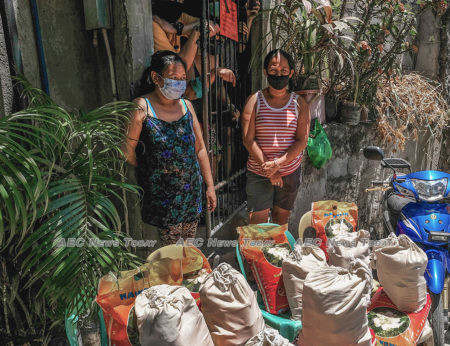The Asian Development Bank (ADB) has launched a $5 million project to help the Philippine government deliver food supplies to up to 55,000 vulnerable households in Metro Manila and neighbouring areas, which are under enhanced community quarantine to contain the spread of COVID-19.
The Rapid Emergency Supplies Provision Project (RESPP) will be implemented under the Tagalog name ‘Bayan Bayanihan’ (the Filipino principle of sharing what one has with one’s community). It will leverage ADB and private sector resources to provide essential food supplies to vulnerable households on Luzon island, including Metro Manila, to bridge the gap until other support mechanisms are activated.
Beneficiaries will include the poorest families, as well as informal sector workers who have lost their livelihoods because of an extended period of self-isolation and business closures—measures needed to keep the spread of COVID-19 under control.
“The Bayan Bayanihan project will ensure that tens of thousands of the poorest and most vulnerable households in the Philippines, our host country, will continue to be able to put food on the table as they cope with the impacts of COVID-19”, said ADB President, Masatsugu Asakawa.
“This unique programme will combine the core strengths of the government, ADB, and domestic and global philanthropic, private entities to improve the health, living conditions, and resilience of households most affected by the pandemic.”

The first deliveries under theBayan Bayanihan project—2,000 50-kilogram (About 110lbs) sacks of rice—were successfully made on March 31 in the cities of Caloocan, Manila, Pasay, and Quezon, with food varieties and households chosen based on government guidelines.
More food—including rice, drinks, and canned sardines, tuna, and corned beef—will be delivered to households in Malabon on Friday (April 3).
More than 75 per cent of the Philippines’ confirmed COVID-19 cases are in Manila and nearby provinces, a dense urban area that is also the largest contributor to the country’s economy.
On March 24, Philippine President Rodrigo Duterte signed the Bayanihan to Heal as One Act to provide emergency cash assistance of PHP5,000 to PHP8,000 (about US$98 to $158) a month to about 18 million low-income households.
ADB’s $5 million grant will complement initiatives of the government and the private sector. Through collaboration with philanthropic, private entities, ADB aims to attract more contributions to support the expansion of the Bayan Bayanihan programme, so more vulnerable households can be supported for a longer period of time.
The Bayan Bayanihan programme builds on ADB’s support to the Philippine government in its fight against COVID-19. On March 14 ADB approved a $3 million grant to help the government purchase emergency medical supplies and deliver immediate and effective health care services.
On March 18 2020, ADB announced an initial package of approximately $6.5 billion to address the immediate needs of its developing member countries, including the Philippines, as they respond to the COVID-19 pandemic.
ADB stands ready to provide further financial assistance and policy advice down the road whenever the situation warrants. Visit ADB’s website to learn more about our ongoing response.
This article first appeared on the Asian Development Bank under a Creative Commons License and is produced here with its permission.
Feature video Asian Development Bank
Related:
- $49 mln ADB package to boost rural hygiene for 400,000 in Cambodia(AEC News Today)
- ADB lays out $200 million for COVID-19 supply chains(AEC News Today)
- ADB: Philippine GDP to slide at 2% in 2020 due to COVID-19; rebound to 6.5% in 202(GMA News Online)
In 2017, ADB operations totalled $32.2 billion, including $11.9 billion in co-financing.
Latest posts by Asian Development Bank (see all)
- RRTS: Increasing inter-island trade in the Philippines through island hopping – June 22, 2020
- Bayan Bayanihan brings food and hope to the poorest of the poor – May 21, 2020
- COVID-19: the time to act on food security is now – May 10, 2020
- No handwashing for 1 in 5 Indonesians as COVID-19 runs wild – May 8, 2020

